Zoom
Trash

Curiosity. Curious children gather around photographer Toni Frissell, looking at her camera Curiosity (from Latin curiosus "careful, diligent, curious," akin to cura "care") is a quality related to inquisitive thinking such as exploration, investigation, and learning, evident by observation in human and many animal species.[1][2] The term can also be used to denote the behavior itself being caused by the emotion of curiosity.
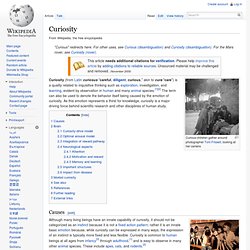
As this emotion represents a thirst for knowledge, curiosity is a major driving force behind scientific research and other disciplines of human study. Causes[edit] Children peer over shoulders to see what their friends are reading. Although many living beings have an innate capability of curiosity, it should not be categorized as an instinct because it is not a fixed action pattern; rather it is an innate basic emotion because, while curiosity can be expressed in many ways, the expression of an instinct is typically more fixed and less flexible. Imagination. Imagination, also called the faculty of imagining, is the ability to form new images and sensations that are not perceived through senses such as sight, hearing, or other senses.
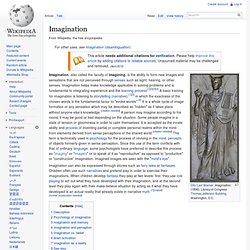
Imagination helps make knowledge applicable in solving problems and is fundamental to integrating experience and the learning process[1][2][3][4] A basic training for imagination is listening to storytelling (narrative),[1][5] in which the exactness of the chosen words is the fundamental factor to "evoke worlds".[6] It is a whole cycle of image formation or any sensation which may be described as "hidden" as it takes place without anyone else's knowledge.
[citation needed] A person may imagine according to his mood, it may be good or bad depending on the situation. Some people imagine in a state of tension or gloominess in order to calm themselves. Optimism. Berlin Wall Monument (West view) – the west side of the Wall is covered with graffiti that reflects the hope and optimism post-1989 The word is originally derived from the Latin optimum, meaning "best.
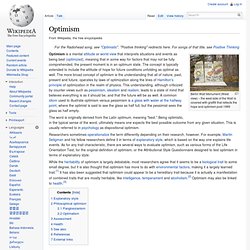
" Being optimistic, in the typical sense of the word, ultimately means one expects the best possible outcome from any given situation. This is usually referred to in psychology as dispositional optimism. Hope. Hope is an optimistic attitude of mind based on an expectation of positive outcomes related to events and circumstances in one's life or the world at large.[1] As a verb, its definitions include: "expect with confidence" and "to cherish a desire with anticipation".[2] In psychology[edit] Dr.
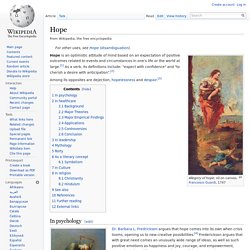
Barbara L. Fredrickson argues that hope comes into its own when crisis looms, opening us to new creative possibilities.[4] Frederickson argues that with great need comes an unusually wide range of ideas, as well as such positive emotions as happiness and joy, courage, and empowerment, drawn from four different areas of one’s self: from a cognitive, psychological, social, or physical perspective.[5] Hopeful people are "like the little engine that could, [because] they keep telling themselves "I think I can, I think I can".[6] Such positive thinking bears fruit when based on a realistic sense of optimism, not on a naive "false hope".[7]
Libertarianism. Traditionally, libertarianism was a term for a form of left-wing politics; such left-libertarian ideologies seek to abolish capitalism and private ownership of the means of production, or else to restrict their purview or effects, in favor of common or cooperative ownership and management, viewing private property as a barrier to freedom and liberty.[6][7][8][9] In the United States, modern right-libertarian ideologies, such as minarchism and anarcho-capitalism, co-opted the term in the mid-20th century to instead advocate laissez-faire capitalism and strong private property rights, such as in land, infrastructure, and natural resources.[10][11][12] Etymology[edit] The 17 August 1860 edition of Le Libertaire: Journal du Mouvement Social, a libertarian communist publication in New York In the mid-1890s, Sébastien Faure began publishing a new Le Libertaire while France's Third Republic enacted the lois scélérates ("villainous laws"), which banned anarchist publications in France.
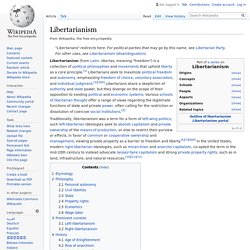
Liberalism. Liberalism is a political philosophy or worldview founded on ideas of liberty and equality.[1] Liberals espouse a wide array of views depending on their understanding of these principles, but generally they support ideas such as free and fair elections, civil rights, freedom of the press, freedom of religion, free trade, and private property.[2][3][4][5][6] Etymology and definition[edit] Words such as liberal, liberty, libertarian, and libertine all trace their history to the Latin liber, which means "free".[13] One of the first recorded instances of the word liberal occurs in 1375, when it was used to describe the liberal arts in the context of an education desirable for a free-born man.[13] The word's early connection with the classical education of a medieval university soon gave way to a proliferation of different denotations and connotations.

Electricity. Autumn. Autumn, interchangeably known as fall in the US and Canada,[1] is one of the four temperate seasons.
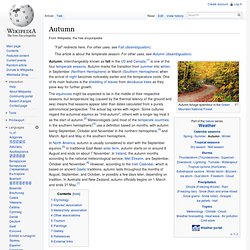
Autumn marks the transition from summer into winter, in September (Northern Hemisphere) or March (Southern Hemisphere) when the arrival of night becomes noticeably earlier and the temperature cools. One of its main features is the shedding of leaves from deciduous trees as they pave way for further growth. The equinoxes might be expected to be in the middle of their respective seasons, but temperature lag (caused by the thermal latency of the ground and sea) means that seasons appear later than dates calculated from a purely astronomical perspective. The actual lag varies with region. In North America, autumn is usually considered to start with the September equinox.[5] In traditional East Asian solar term, autumn starts on or around 8 August and ends on about 7 November. Easter. The last week of Lent is called Holy Week, and it contains the days of the Easter Triduum, including Maundy Thursday (also known as Holy Thursday), commemorating the Last Supper and its preceding foot washing,[8][9] as well as Good Friday, commemorating the crucifixion and death of Jesus.[10] Easter is followed by a fifty-day period called Eastertide, or the Easter Season, ending with Pentecost Sunday.
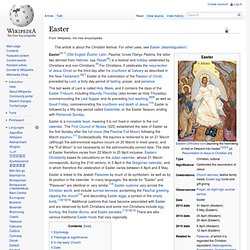
Easter is a moveable feast, meaning it is not fixed in relation to the civil calendar. The First Council of Nicaea (325) established the date of Easter as the first Sunday after the full moon (the Paschal Full Moon) following the March equinox.[11] Ecclesiastically, the equinox is reckoned to be on 21 March (although the astronomical equinox occurs on 20 March in most years), and the "Full Moon" is not necessarily on the astronomically correct date. The date of Easter therefore varies from 22 March to 25 April inclusive. Etymology Theological significance. Lemon. History A lemon tree has fruit and flowers The origin of the lemon is a mystery, though it is thought that lemons first grew in Assam (a region in Northeast India), northern Burma, and China.[1][2] A study of the genetic origin of the lemon reported that it is a hybrid between sour orange and citron.[3] Lemons were known to the Jews of Jerusalem, who, according to Josephus, pelted an errant high priest with them during a festival in the 90s BC,[4] although Jewish tradition maintains that this was done with citrons, not lemons.[5] They entered Europe near southern Italy no later than the 1st century AD, during the time of Ancient Rome.

However, they were not widely cultivated. They were later introduced to Persia and then to Iraq and Egypt around 700 AD. Summer. A field during summer in Belgium Timing[edit] From an astronomical view, the equinoxes and solstices would be the middle of the respective seasons,[1][2] but a variable seasonal lag means that the meteorological start of the season, which is based on average temperature patterns, occurs several weeks later than the start of the astronomical season.[3] According to meteorologists,[4][5] summer extends for the whole months of June, July, and August in the northern hemisphere and the whole months of December, January, and February in the southern hemisphere.
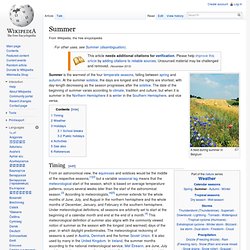
Under meteorological definitions, all seasons are arbitrarily set to start at the beginning of a calendar month and end at the end of a month.[4] This meteorological definition of summer also aligns with the commonly viewed notion of summer as the season with the longest (and warmest) days of the year, in which daylight predominates. The meteorological reckoning of seasons is used in Austria, Denmark and the former Soviet Union.
Mardi Gras. Traditions[edit] Carnival is an important celebration in Anglican and Catholic European nations.[6] In the United Kingdom and Ireland, the week before Ash Wednesday is called "shrovetide", ending on Shrove Tuesday. It has its popular celebratory aspects as well. Animal Crossing. Four Animal Crossing games have been released worldwide, one each for the Nintendo GameCube, Nintendo DS, Wii, and the Nintendo 3DS. The series has been both critically and commercially successful and has sold 23.711 million units worldwide.[1][2][3][4] Gameplay[edit] One notable feature of the Animal Crossing series is the high level of customization available, some of which affects the outcome of the game.[6] The player character is both named and gendered, and their appearance can be modified by buying or designing custom clothes and accessories or changing the hairstyle (introduced in Wild World).
The player's house can also be furnished, decorated, and later expanded: the player can purchase and collect furniture from Tom Nook, the village merchant, and place it anywhere in the house, as well as change both the wallpaper and floor designs. Love. For information about showing love on Wikipedia, see WP:LOVE and WP:♥. Love in its various forms acts as a major facilitator of interpersonal relationships and, owing to its central psychological importance, is one of the most common themes in the creative arts.[8] Love may be understood as a function to keep human beings together against menaces and to facilitate the continuation of the species.[9] Cowardice. Cowardice is a trait wherein fear and excess self-concern override doing or saying what is right, good and of help to others or oneself in a time of need—it is the opposite of courage.
As a label, "cowardice" indicates a failure of character in the face of a challenge.[1] Etymology[edit] The English surname Coward (as in Noël Coward), however, has the same origin and meaning as the word "cowherd". Military law[edit] Intelligence. Intelligence is most widely studied in humans, but has also been observed in non-human animals and in plants. Traffic light. Traffic lights, also known as traffic signals, traffic lamps, signal lights, stop lights and robots,[1] and also known technically as traffic control signals[2] are signalling devices positioned at road intersections, pedestrian crossings and other locations to control competing flows of traffic.
Traffic lights were first installed in 1868 in London[3] and are now used all over the world. Caution. From Wikipedia, the free encyclopedia Caution may refer to: Friendship. Portrait of Two Friends by Italian artist Pontormo c. 1522 Friendship is a relationship of mutual affection between two or more people.[1] Friendship is a stronger form of interpersonal bond than an association. Warning sign. Happiness. Recreation. Warm. Sunlight. The ultraviolet B component of sunlight on the skin is an effective source of vitamin D3 (cholecalciferol) from serum cholesterol.
Summary[edit] Sunlight may be recorded using a sunshine recorder, pyranometer, or pyrheliometer. Sunlight takes about 8.3 minutes to reach the Earth from the surface of the Sun. A photon starting at the centre of the sun and changing direction every time it encounters a charged particle would take between 10 000 and 170 000 years to get to the surface.[2]